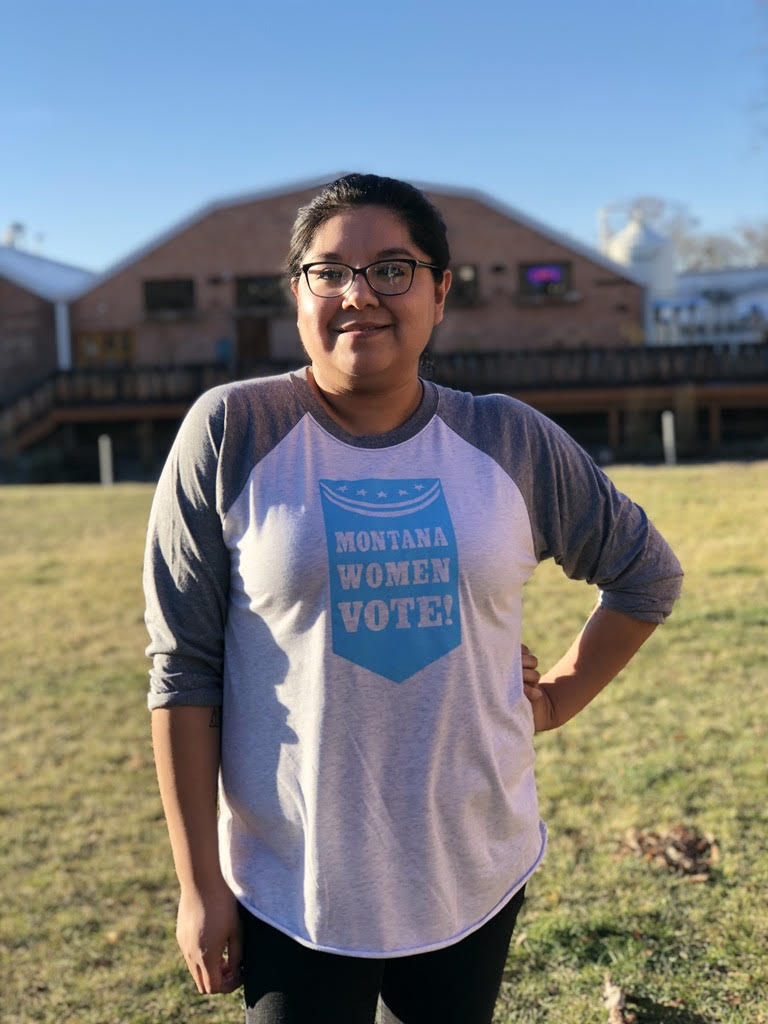Getting involved in local politics and advocating to your tribal government is an important way to make your voice heard.
According to Danielle Vazquez, a long-time community organizer from the Rocky Boy Reservation in Montana: “Don’t be afraid to go and voice your opinion on things. Tell tribal council what things you think need to be changed or addressed and be vocal.”
Since 2015, Danielle has been helping people get involved with the political process. She has done this by registering people to vote, educating community members on important issues, and advocating for issues important to her tribe. One of the most important parts of her work is making sure community members and the tribal council understand policies being considered by the Montana state legislature.
In July 2021, Danielle jumped on a Zoom call to share advice about how youth can advocate to their tribal governments and make real change. She also described her path to policy and advocacy.
“Growing up on the reservation, you see so much bad stuff. I wanted better for my community,” reflected Danielle. “It will take a radical shift to get to where we are thriving. For the meantime, I’m going to focus on policy. That’s the little part where I can make some change.”
Here are her tips on being an advocate in your tribal community:
Show Up
Attend tribal council meetings, speak at tribal council meetings, write your tribal council members a letter, or provide written comments on a specific policy they are proposing. Most council meetings will have a time when anyone can speak about issues important to them. “I want kids to know that the tribal government works for you,” Danielle said. “What are the things you’re seeing in your community that you want to change? Take those to your tribal council. Be really vocal.”
Vote
If you are able to, vote! Voting is an important way to make your voice heard. You can also help register your family and friends to vote, educate them on issues being voted on in state, local, and tribal municipalities, or volunteer for election campaigns.
Take a Class
If they are available, take a class to learn more about tribal sovereignty, tribal history, and governance. Your high school or local community college may have classes on these topics. Danielle studied social work in college, and a policy class made her more interested in learning about federal Indian policy and sovereignty. These skills impact her work to this day.
Find Like-Minded People
If you want to make a big impact, work with other people! Advocacy can be more impactful if a group of people are working together on the same issues. Find a group of people who care about the same issues as you, or volunteer for organizations in your community that are advocating for the same issues you care about.
Self-Care
Advocacy can be tiring work. “For me, creating boundaries has gone a long way,” reflected Danielle. “Learn to say no when your plate is full. Be honest with yourself on what you can handle.” It is important to take care of your mental and physical health by resting and recharging. Make sure to take time to relax, do your hobbies, spend time with loved ones, and do what makes you happy. There are a lot of injustices in the world, but if you don’t take care of your own wellness and do regular self-care, you can get burned out and not have the energy to continue to fight for the things you care about and be present for the joyful parts of life.
Want to learn more about advocacy? Check out these resources:
- The Center for Native American Youth produces an annual State of Native Youth Report to help educate policy makers on key issues facing Native youth. Read the 2020 report here!
- The Racial Equity Tools website has a webpage dedicated to resources on Community Organizing. Check it out here!
- POC Online Classroom has a variety of readings, resources, and toolkits on organizing and activism. Check them out here!
- Want to learn more about advocacy and the federal government? Read this article!
Author: Abaki Beck (Blackfeet and Red River Metis) is a freelance writer and public health researcher passionate about health equity in Native communities, particularly for justice-involved community members. She earned her Master’s in Public Health in 2020 and grew up in Montana.


